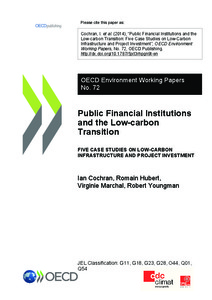Public financial institutions and the low-carbon transition. Five case studies on low-carbon infrastructure and project investment
"Public financial institutions (PFIs) are well-positioned to act as a key leverage point for governments’ efforts to mobilise private investment in low-carbon projects and infrastructure. The study identifies the tools, instruments and approaches used by five PFIs to directly support and scale-...
| Main Authors: | , |
|---|---|
| Institution: | ETUI-European Trade Union Institute |
| Format: | TEXT |
| Language: | English |
| Published: |
Paris
2014
OECD |
| Subjects: | |
| Online Access: | https://www.labourline.org/KENTIKA-19116381124919345639-Public-financial-institutions-.htm |
| Summary: | "Public financial institutions (PFIs) are well-positioned to act as a key leverage point for governments’ efforts to mobilise private investment in low-carbon projects and infrastructure. The study identifies the tools, instruments and approaches used by five PFIs to directly support and scale-up domestic private sector investment in sustainable transport, energy-efficiency and renewable energy in OECD countries. Between 2010-2012, these five institutions – Group Caisse des Dépôts in France, KfW Bankengruppe in Germany, the UK Green Investment Bank, the European Investment Bank, and the European Bank for Reconstruction and Development – have provided over 100 billion euros of equity investment and financing for energy efficiency, renewable energy and sustainable transport projects. They use both traditional and innovative approaches to link low-carbon projects with finance through enhancing access to capital; facilitating risk reduction and sharing; improving the capacity of market actors; and shaping broader market practices and conditions." |
|---|---|
| Physical Description: | 93 p. Digital |

